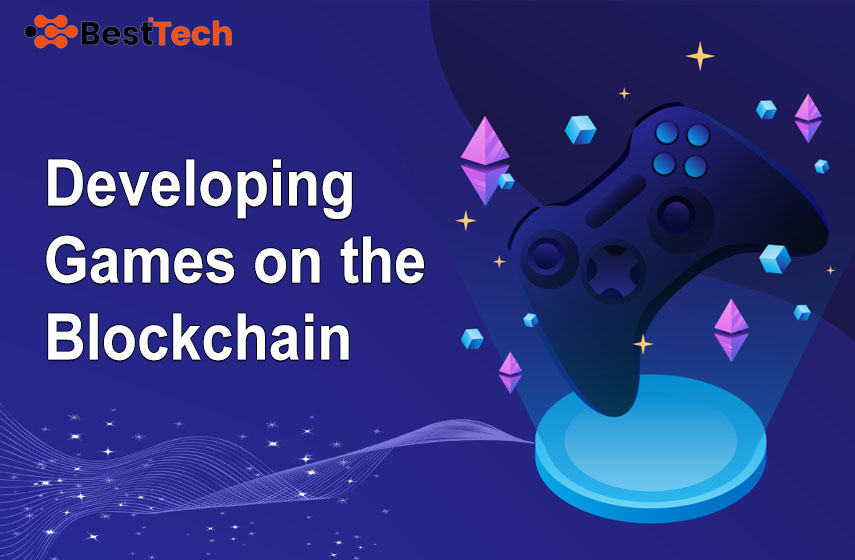Blockchain technology has emerged as a revolutionary force that can change industries in many fast-changing technology and entertainment sectors. The gaming business is one area that has been impacted upwardly. The possibility of combining blockchain technology and video games is now being investigated by programmers, opening up exciting new development avenues. The gaming industry is one such area that gains a lot from blockchain integration. Outcomes of blockchain technology and gaming combo are a fresh way of creating several advantages and altering how games are imagined, developed, and played. In this piece, we’ll explore the fascinating world of blockchain-based game development and its many advantages.
What is the Blockchain gaming?
Blockchain gaming is an introduction of blockchain technology into the video game industry. This technology is an independent, distributed digital ledger that securely and openly records activities and information. Blockchain innovation offers new game ownership, security, and player involvement options.
Here are some fundamental characteristics and concepts related to blockchain gaming.
Ownership and Digital Assets
The capacity to create and exchange exclusive, limited-edition digital goods that players own is one of the key benefits of blockchain gaming. These blockchain-stored digital assets, or “non-fungible tokens” (NFTs), can stand in for in-game objects, characters, skins, or virtual land. These things belong to the players, and they can buy, sell, or trade them even outside the game.
Decentralized Applications

On particular blockchain networks, several blockchain gaming projects function as decentralized applications. Native tokens are a common feature of many DApps, which users can acquire, use in-game, or exchange on cryptocurrency exchanges.
Challenges and Scalability
Blockchain gaming offers unique plans and opportunities, but it also confronts challenges with scaling, high transaction costs on particular blockchain networks, and the requirement that users comprehend how blockchain technology functions.
Player-driven Economies
The value of in-game objects can be based on supply and demand in player-driven economies that blockchain games can create. Players can acquire real-world value by participating in these economies through gameplay, asset trading, or attendance at token-based events.
Play-to-Earn
Some blockchain games feature a “play-to-earn” business model, where users can participate in the game to earn cryptocurrency tokens or other valuable digital assets. This could involve finishing chores, hitting in-game milestones, or contributing to the game’s ecosystem.
Benefits of Developing Games on the Blockchain
Transparency and Immutability
There are two characteristics of blockchain technology: transparency and immutability. These factors can improve the gaming experience in many different ways. Cheating, item duplication, and unfair advantages have plagued game developers and gamers in conventional gaming.
Blockchain technology enables game makers to build a free and impermeable ecosystem where all transactions, actions, and changes are saved on an irreversible ledger. This supports an equitable and balanced environment for players by ensuring that in-game assets and transactions are secure, verifiable, and unaffected by manipulation.
Actual Ownership of In-game Assets
Non-fungible tokens (NFTs), introduced by blockchain technology, allow players to own in-game goods. NFTs allow players to directly own, trade, and sell virtual assets among themselves, unlike regular games where items are stored on centralized servers and controlled by developers. Enable all the participants to monetize their successes and investments independently; this innovation empowers them and, in the process, eliminates the distinction between virtual and actual ownership.
Interoperability and Cross-Platform Play
Due to the decentralized nature of blockchain, interoperability has become possible, allowing for seamless cross-platform communication across games. As a result, gamers can enjoy the same in-game characters and materials across several platforms, including in other games. Removing platform-specific restrictions improves user engagement and increases the potential player base.
Enhanced Security and Anti-Piracy Measures
Game piracy and unauthorized distribution have long been problems for game developers, resulting in affected player experiences and lost money. By employing smart contracts with blockchain, game distribution can be effectively managed, ensuring that only authentic copies of the game are bought, sold, or utilized. They try to protect game developers’ intellectual property and ensure that users receive original, undamaged copies of the game, helping to increase security and reduce the chance of piracy.
Community Engagement and Tokenization
With tokenizing game elements, blockchain enables developers to build community-driven ecosystems. For their contributions and participation in competitions, players can receive rewards in the form of these tokens. Ultimately, players make a stronger bond with the game because, with hard work, they can enjoy the rewards. Outside the game, players can also utilize these tokens to participate in the game’s growth by casting votes for new features or content.
Smart Contracts for Automated Gameplay
The way the game works might completely change because of smart contracts. These are special contracts that can run by themselves, and they have all the rules of the agreement written right in the computer code. Game designers can use intelligent contracts to build dynamic, growing game environments where player actions result in predetermined outcomes. This can result in more intricate and fascinating stories and creative features that react to real-time player activity.
Monetization and Microtransactions
Blockchain launched a modern feature for monetization via microtransactions, which helps players make quick and secure payments for in-game services. Using cryptocurrencies, developers can reduce transaction costs and provide opportunities to players with a more seamless payment experience. Furthermore, due to blockchain’s openness, players are always aware of the cost and scarcity of what they buy.
Conclusion:
Games built on the blockchain have the potential to transform the gaming business. It has unquestionable benefits, such as encouraging genuine ownership and opening up new ways to make money while having fun. As blockchain technology develops, there will be more opportunities for creative and engaging gameplay. Whether you’re a gamer searching for fresh ways to play or a programmer looking to break new ground, the blockchain gaming frontier is calling your name.

